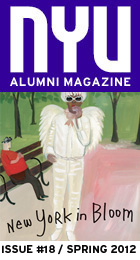nonfiction
Teacher’s Pest
Scholar Irshad Manji won’t quit asking uncomfortable questions
by Wesley Yang
Irshad Manji is railing against what she calls “good Western liberals.” Sitting in her office in the Puck Building, the Robert F. Wagner Graduate School of Public Service professor talks about a case in which one Toronto district school board, for the sake of religious diversity, had cordoned off a section of its middle-school cafeteria for Friday prayer for Muslim students—thereby, in Manji’s view, implicating itself in sexist abuses that it would not condone under any other circumstances. Boys and girls are segregated during prayer, with girls sitting well behind the boys. “Those girls who are on their periods are sent to the very back of the room,” explains Manji, noting that she witnessed this in her own madrassa, or religious school, while growing up in suburban Vancouver. “It’s not that we were considered merely different; we were considered dirty, unhygienic. Okay? And part of the filth that corrupts when it comes near anything that is male.”She calls that a double standard. “If the Toronto district school board people were to meet a white man who wouldn’t shake the hand of a black man for fear of being polluted, they would definitely bust his balls,” she says, but when it comes to women and Islam, “Somehow [it’s simply], ‘That’s what those people do.’ ”
Since the publication of her first book, The Trouble With Islam Today: A Muslim’s Call for Reform in Her Faith (St. Martin’s Griffin), Manji has become a highly visible scourge of what she calls the sexist, racist, and anti-Semitic strains within the Islamic community, and also of the Western liberals whose misplaced reverence for other cultures, as she characterizes it, makes them complicit in this oppression. Her book posed difficult questions on the practice of “honor killing,” the discouragement of independent thought within madrassas, and the embrace of anti-Semitism at a peculiarly uncomfortable time for Islam—while American soldiers were trooping through Iraq and Afghanistan. It seemed like a strategic error to many Muslims. Some called it opportunistic pandering or worse. “I’ve been spat at,” she recalls. “I’ve had people come up to me at public events and start screaming.”
But other voices began to flood her inbox as well—a global constituency, as she describes it, of thousands of individuals marooned throughout the Islamic diaspora. Manji’s self-assigned role is to use the platform that the West has granted her to provide succor to those who want to pose difficult questions to their own parents, imams, and tribal elders. Her newest book, Allah, Liberty, and Love (Free Press), consists of e-mails from these fugitive voices—typically young people yearning for wider freedoms—as well as brief accounts of others who broke with their own communities in defense of “universal standards of dignity and decency.” She cites crusaders such as Lillian Smith, a white Southern writer who took an antisegregation stance in the 1940s, and Abdul Ghaffar Khan, a nonviolent Pakistani activist who defended women’s equality and fought for Muslim-Hindu unity.
Such moral outliers, Manji says, exemplify the goal of the institute she leads at Wagner—the Moral Courage Project—which hosts lectures and symposia devoted to the subject and has featured speakers such as author Salman Rushdie. Manji also teaches a course designed not just to study outliers of the past but to equip young leaders to resist the settled consensus within their communities. It’s not just a matter of Muslims challenging the excesses of Islam, she says; a deadening groupthink also kept many Wall Street figures from speaking out in the lead-up to the financial crisis.
Manji is not, as many of her detractors have been quick to point out, a scholar of Islam or an expert on any of the regions in which Islam is the dominant religion. She is, instead, a grown-up version of the pestering student she had once been: “I would ask the [madrassa] teacher, ‘Why can we not take Jews and Christians as friends?’ and ‘Why can women not lead the congregational prayer?’ And by the age of 14, I had asked one too many of these inconvenient questions and was told to get out.”
She went on to avail herself of the many freedoms afforded to Westerners—to think
independently, to affirm her lesbian sexuality, to conclude that the Zionists’ historical
claim to the land of Israel is a just one—and she insists that her position is as relevant
as any other to the struggle for the future of Islam. “When I left, I had to remind my
mother”—who brought Manji to Canada after being expelled from Uganda by Idi
Amin—“ ‘I just left the madrassa. I haven’t left
Allah.’ ”
When asked whether she ever worries that her public quarrels with Islam embolden bigots and Islamophobes, Manji responds with a passionate speech that references Rabbi Abraham Joshua Heschel, who linked arms with Martin Luther King Jr. at the march at Selma. He knew that by joining the civil rights movement, he’d risk feeding the anti-Jewish sentiment in the South. “Heschel said, ‘That may very well be true, but I have to do the right thing anyway,’ ” Manji notes. Ultimately, she believes that such moral courage is innate in all of us: “We know that certain things are just wrong, okay? Killing your daughter for any reason, let alone to cleanse the family—that is just wrong. No matter what culture you come from, there is a basic level of human decency and dignity that you can relate to as a fellow human being. What is the right thing to do? End of story. Do it. Just do it.”







